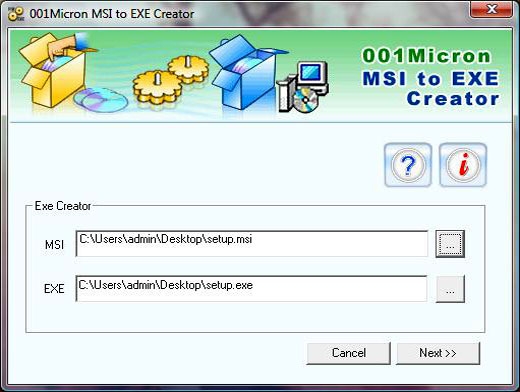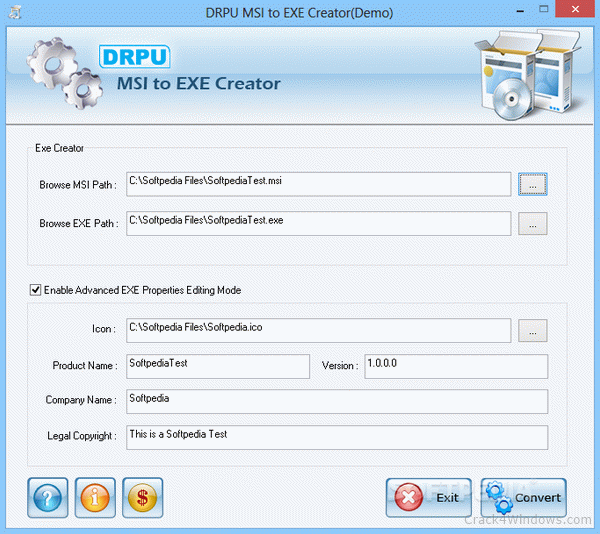Recently I had two separate situations that arose in which I had a MSI and needed to convert each to an InstallShield Project. One was a project that was originally a WISE installation, and the other was a InstallShield MultiPlatform package. In both situations I had access to a MSI Package, and chose to convert it to an InstallShield package. Solved: Dear All How to Convert DC pro.exe file to DC pro.msi file? To Fix (Convert.exe to.msi) error you need to follow the steps below. Download (Convert.exe to.msi) Repair Tool.
Problem:
You need to extract an .msi file from an .exe installer.
Solution:

There are at least three ways of solving this problem, but none of them is universal. You might need to go through all of them to find the one that works for the EXE installer that you have.
CodeTwo strongly advises against extracting (and using) MSI files from the EXE installers of the CodeTwo software. Unless the product website allows such an operation (or unless you are instructed/allowed to do so by CodeTwo Support), use the .exe setup files.
The first method is based on the fact that most installers extract their .msi files to the temporary files folder during the installation process. To extract an MSI file from an EXE installer, you need to:
- Launch your .exe file.
- When you see the first prompt (e.g. a question about whether you want to continue installation, accept a license agreement, etc.), do not click anything in this window and do not close it.
- Open Windows Explorer, type %temp% in the address bar and press Enter.
- Sort the files in the folder by the modification date. The newest file on the list should be the .msi file you are looking for.
- Copy the MSI file to a safe location before you close the installer prompt window (see step 2). Be aware that if you close the installer window, the MSI file will be immediately deleted from the temporary files folder.
The second method uses a free third-party tool called 7-Zip to browse the content of the .exe installer file. Follow the steps below.
- Download 7-Zip from this page and install it.
- Right-click on the .exe file (from which you want to extract an .msi file) and from the shortcut menu choose 7-Zip > Open Archive.
- Do not extract any files yet. Instead, browse and look for the folder MSI within the contents. It might take some time to find this folder because it is not always located directly in the root directory (its location may vary depending on the installer).
- When you locate the MSI folder, you will notice that it most likely does not contain any .msi files, but a file or files with no extensions and rather cryptic names such as 132. Despite these misleading names, these are actually the MSI files you are looking for.
- Drag and drop these files to any desired folder or select them and extract them with 7-Zip. Close 7-Zip after that.
- Change the names of the extracted files so that they include the .msi extension.
- If there are two files, the larger one is the 64-bit installer, and the smaller one is the 32-bit version. Use the one you need.
The third method works with InstallShield based projects. To get the MSI file from your EXE installer, you need to:
- Log on to a computer where the software (the installer of which you would like to access) is not installed. This is because this method forces the uninstalling process to trigger extraction of the .msi file. If you already have this software installed, this method will remove it, which might not be desired.
- Run Windows Command Prompt (cmd) (in Windows 10: open the Start menu, type cmd and press Enter) and go to the folder where your EXE file is located.
- Execute the command below:
replace <file.exe> with the name of your .exe file and <target-folder> with the path to the folder where you want the .msi file to be extracted (for example C:Folder).
As described in this thread, the switches for the command above do the following:
- /s /x - silently (/s) uninstalls (/x) the product from the system;
- /b - defines the target path for the .msi file;
- /v - passes desired arguments to the installer. In this case, the argument is /qn - it disables GUI and any prompts.
Home > Search converters: exe to msi
Conversion of exe file format to msi file format beta

Search for exe to msi converter or software able to handle these file types.
Bookmark & share this page with others:
Convert Program executable to Microsoft Windows Installer installation package.
We have found one software suitable in our database for this conversion.
You can use utilities like the MSI Wrapper, which are specially designed to create a .msi program installation packages from older .exe installation packages prepared using some older solutions. This type of exe to msi conversion or transformation is used mainly by system administrators to prepare new packages that work with group policies.
Updated: June 22, 2021
Microsoft Windows software - convert exe to msi on Windows
MSI WRAPPER
A converter from EXE to MSI packages
File extension | Convert | Open | Save | Edit | Create | Import | Export | Extract |
|---|---|---|---|---|---|---|---|---|
Convert from exe file | No | No | No | No | No | Yes | No | No |
to msi file | No | No | No | No | No | No | Yes | No |
The table with program actions contains information about what each program is capable of doing with their files. This may be a good pointer for further searches for certain file conversions and help you find the converter you are looking for if our search result is insufficient for you. However, it is far from perfect and may sometimes show results which are not really usable because of the nature of the software handles the files. So a conversion that appears as possible, just because of matched actions, may in fact not be possible.
Additional links: Open exe file, Open msi file
EXE
An exe file extension is traditionally used for main executable files since the times of MS-DOS. It was adopted for executables in Windows as well. Executables are files that launch programs.
How To Convert Msi To Exe
MSI
Files with msi extension is commonly used for Microsoft Installation packages used by most Windows based programs. If you open msi file in Windows, the installation procedure will commence.
Convert Msi To Exe
Back to conversion search